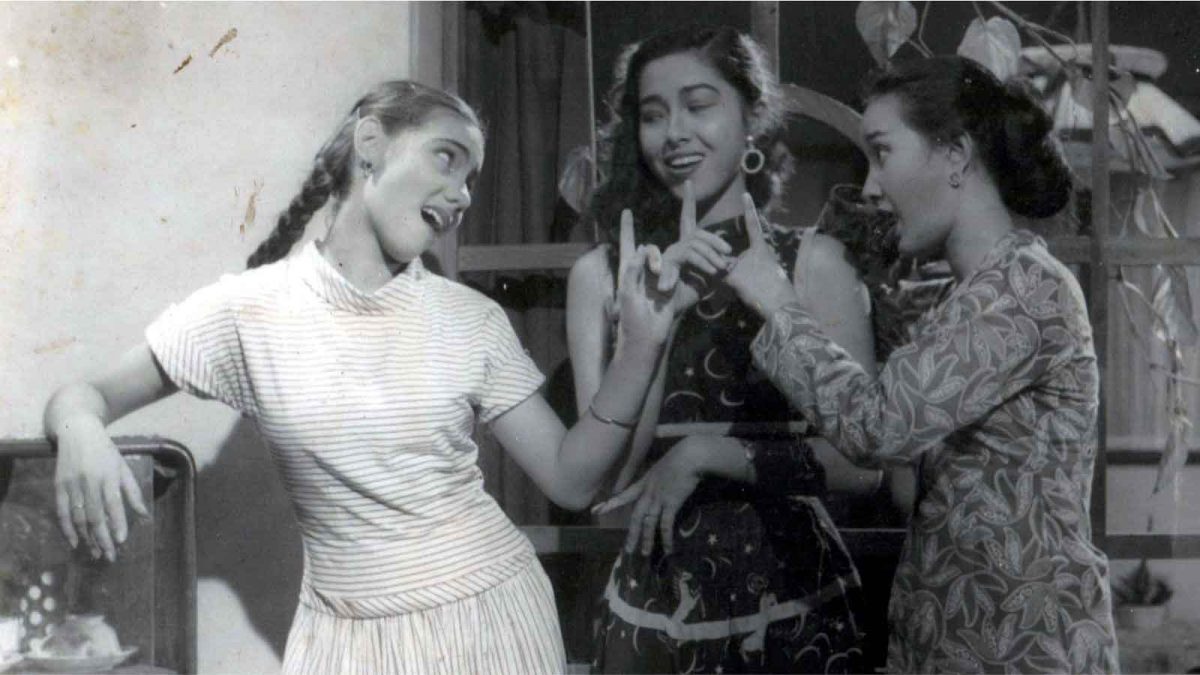Three Maidens

Tiga Dara
Usmar Ismail
Indonesia – 1957

Cinematography: Max Tera
Production: Perusahaan Film Nasional (Perfini) Studio
Language: Indonesian
Duration: 116
Color: Black and White
Synopsis: Nunung, Nana and Nenny are sisters who live in Jakarta with their grandmother and widowed father, Sukandar. Concerned that the eldest, Nanung, might be getting too old to marry, the family does everything they can to arrange a match. When the father’s colleagues are invited to hear Nanung sing and play the piano, they are truly impressed. However, the men are all too old, and grandmother insists that Sukandar find a younger man. Nenny, and Nana are also asked to make introductions, but Nanung is distant and disinterested and, in spite of everyone’s good intentions, resents all the fuss. When Toto bumps into Nunung with his scooter, he feels so awful about the accident that he begins visiting her regularly. Nunung initially rejects his advances, and he ends up dating her younger sister. A comedy of errors ensues, in which lovers are mismatched, and sisterly rivalry forces Nunung to take a break from the family and stay with her uncle in Bandung. She sends home a letter that provokes Toto’s jealousy and he travels from Jakarta to Bandung to finally profess his love.
Notes:
An indigenous Indonesian cinema began in earnest in the first year of independence in 1950 with the setting up of new film companies. In early 1950 the Perfini company was established by the pioneering West Sumatran-born writer-producer-director, Usmar Ismail, and a little later the Persari company was established by the producer and entrepreneur (also West Sumatran-born) Djamaluddin Malik. The early years were a struggle, with Usmar Ismail’s company attempting to make quality films somewhat ahead of audiences’ tastes (who far preferred dancing films and musicals). His first post-independence productions – Darah dan Doa (The Long March, 1950), Enam Djam di Djogdja (6 Hours in Jogja, 1951) and Lewat Djam Malam (After the Curfew, 1954) – celebrate the revolutionary years. However, as postwar and post-revolutionary productions, they also displayed an unusual scepticism quite unlike that which we encounter in the Soviet Union of the 1920s. These were dramas that highlighted the moral ambiguities of the revolutionary period, understated, and subtle. They were different too from the films by most of the Italian Neo-Realists of the 1940s whose location shooting methods influenced Usmar Ismail. His most successful film, Krisis, which has been lost and survives only as a script, was a comedy about the housing crisis in the early years of the republic. In 1955 he made a brilliant and prophetic satire on the dangers of charismatic political leadership in Indonesia, Tamu Agung (Exalted Guest), which was released despite the fact that its humour was directed at President Sukarno, and the film did poorly at the box office.
Tiga Dara was produced on government credit and written in an attempt to cover Perfini’s outstanding debts following Tamu Agung and other recent productions. From the start, it was intended to be a commercial film in spite of Ismail’s general disapproval of such works. It was rewarded in August 1957 with an immense popular success, launching the careers of its stars, earning the highest box office returns of any Perfini film, as well as screenings in first-class cinemas (which almost exclusively exhibited imported films). Tiga Dara was shown at the 1959 Venice Film Festival and received Best Musical Arrangement at the 1960 Indonesian Film Week. Although Ismail considered it a compromise of his initial vision for Perfini, Tiga Dara became a classic of Indonesian cinema and has been remade a number of times throughout the years. Perfini followed up with a number of commercially oriented films, while Ismail attempted to reassert himself as an auteur with films such as Pedjuang (Warriors for Freedom, 1960), which was screened in competition at the 2nd Moscow International Film Festival in 1961. However, as the years passed, he became increasingly distanced from his early political ideals and made erratic attempts to enter banking, the nightclub industry, and parliamentary politics by the time of his death in 1971.
By 2015 the cellulose acetate negatives of Tiga Dara, held at Sinematek Indonesia, were heavily damaged. They were torn in places, and scenes were besmirched by fungus or lost altogether. Following Lewat Djam Malam (After the Curfew, 1954) in 2012, this was the second film of Ismail’s oeuvre to receive such treatment. The Bologna-based restoration laboratory L’immagine Ritrovata began work in early 2015. After removing dust and fungus, they and reinserted lost scenes using extant copies of the film, and the restored version of Tiga Dara opened on Indonesian screens in August 2016, along with a new soundtrack featuring covers of the original songs by nine contemporary artists.
Notes based on Hanan, David. “Innovation and tradition in Indonesian cinema.” Third Text 102, no. 24 i (2010): 107-121.


